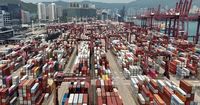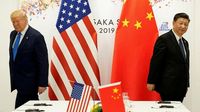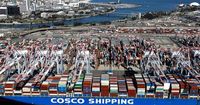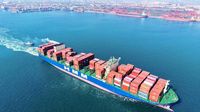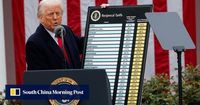In a significant escalation of the ongoing trade war, China announced on Friday, April 4, 2025, that it would impose a 34% tariff on all imported goods from the United States, effective April 10. This retaliatory measure follows a similar tariff announcement from the U.S., made by President Donald Trump earlier in the week as part of his "Liberation Day" package.
The U.S. tariffs, which also stand at 34%, are in addition to previously imposed duties, raising the overall tariff rate on Chinese goods to potentially 54%. The move has sent shockwaves through global markets, with the S&P 500 Index experiencing its largest drop since June 2020, plummeting by 4.8% the previous day. The Nasdaq 100 Index fell by 5.4%, while European markets reacted strongly, with the CAC 40 down approximately 4% and the DAX nearly 5%.
In response to the tariffs, China's Commerce Ministry stated that it had filed a lawsuit with the World Trade Organization (WTO), condemning the U.S. actions as "a typical unilateral bullying practice that endangers the stability of the global economic and trade order." The ministry emphasized that Washington's approach "seriously violates WTO rules, damages the legitimate rights and interests of WTO members, and undermines the rules-based multilateral trading system."
Alongside the tariffs, China announced additional export restrictions on rare earth elements, which are critical in the production of high-tech products such as computer chips and electric vehicle batteries. The list of controlled minerals includes samarium, used in aerospace manufacturing, and gadolinium, which is utilized in MRI scans.
China's customs administration has also suspended chicken imports from two U.S. suppliers, Mountaire Farms of Delaware and Coastal Processing, due to repeated detections of furazolidone, a banned substance in China. Moreover, Beijing has added 27 firms to its list of companies subject to trade sanctions or export controls, with 16 of these facing a ban on exporting dual-use goods.
In a broader context, the trade tensions have sparked fears of a recession, with investment bank JP Morgan now estimating a 60% chance that the global economy will enter a downturn by the end of the year. The escalating tariffs have raised concerns over the costs of goods for American consumers, with experts warning that prices for everyday items could increase significantly.
Trump, speaking from the White House, insisted that his tariff strategy is designed to restore American manufacturing and bolster job growth. "We have been getting the short end of the stick for years," Rep. Jeff Van Drew (R-N.J.) echoed, emphasizing that these tariffs are a necessary response to what he described as unfair trade practices from China.
Chinese Foreign Ministry spokesperson Guo Jiakun stated that the U.S. tariffs violate international trade rules and undermine the multilateral trading system. He urged the U.S. to engage in discussions to resolve trade differences through consultation and mutual respect.
As the situation develops, the implications of these tariffs extend beyond the immediate economic impacts. The trade war has the potential to reshape global supply chains and alter the dynamics of international trade relations. For instance, while the U.S. imports a significant amount of Chinese goods, China is also reliant on U.S. exports, particularly in sectors like agriculture and technology.
In a statement, Trump claimed that the tariffs would ultimately benefit American workers, stating, "Now it's our turn to prosper, and in so doing, use trillions and trillions of dollars to reduce our taxes and pay down our national debt." He expressed confidence that the economic adjustments would lead to a stronger domestic industrial base.
However, analysts caution that the uncertainty surrounding the tariffs could lead to a decline in business confidence and investment, potentially hampering economic growth in both countries. The White House has downplayed the immediate market turbulence, suggesting that it is part of a necessary adjustment process.
As nations grapple with the fallout from these trade measures, the global economic landscape appears increasingly volatile. The European Union, for instance, is also facing pressures to respond to Trump's tariffs, with discussions ongoing about potential retaliatory measures.
In conclusion, the recent developments mark a critical moment in U.S.-China relations, as both nations appear unwilling to back down from their respective positions. The full ramifications of these tariffs will unfold in the coming weeks, as businesses and consumers alike brace for the potential impacts on prices and availability of goods.
